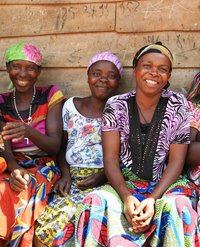Dramatic increases in internal displacement in DR Congo: Almost half the women seeking refuge experience sexualised violence

These figures are from the United Nations Refugee Agency, UNHCR and OCHA, the United Nations Office for the Coordination of Humanitarian Affairs (as of March 2024). According to the UN, in mid-February this year, another 135,000 people left their homes and sought refuge in the provincial capital, Goma, after M23 rebels advanced to a position close to the town Sake on the banks of Lake Kivu. Goma is also the location of the headquarters of one of our partners, PAIF.
The figures are alarming and becoming more so, with ever more people fleeing their homes within the DR Congo. Especially in the east of the country: There are currently more than four million internally displaced people living in the three eastern Congolese provinces of South Kivu, North Kivu and Ituri.
Violence, terror and death as everyday occurrences
There are horrifying reasons why so many people are fleeing their homes: especially in the eastern regions of the country, conflicts result in violence, terror and death. Armed non-state militia and governmental troops have been fighting for power and control for years. It is the civilian population who particularly suffer: children, women, the elderly. They are subjected to arbitrary killings, rapes, torture and plundering.
In addition, life for the people in DR Congo is characterised by severe poverty, especially in the provinces of North and South Kivu. Politically speaking, the country is extremely unstable, so disturbances and conflicts erupt frequently. Then there are the natural disasters such as floods, volcanic eruptions, droughts and landslides which also endanger the population of North and South Kivu, threatening their livelihoods time and again.
DR Congo: Exploitation and discrimination
For all of these reasons, people see no other choice but to leave their homes. Women and girls have even less protection when in flight than in their everyday lives. As in many countries, violent patriarchal structures prevail. In their home region they might have only minimal personal, governmental or economic security, but without even this, they are even more at risk of exploitation, discrimination, rape and other forms of violence.
"In DR Congo there is an almost complete lack of functioning governmental infrastructure. Criminal prosecution is practically absent. In certain situations, women and girls – and other marginalised groups, too – are even more at risk of being subjected to violence than they already are in their everyday lives. This is the case when they have fled to seek refuge, for example."
A United Nations study in 2022 revealed that 46 per cent of women and girls seeking refuge have experienced sexualised violence.
Hope - thanks to our partner organisations
It is difficult, but not impossible, to promote hope and confidence in times like these. Our colleagues at PAIF can offer women and girls who have experienced sexualised violence some hope and prospects for the future.
"It is important to create structures where women can find safety and refuge, but also medical care and the chance to benefit from legal and psychosocial support. The consequences of a severe breach of human rights such as rape are often traumatic."
In recent months, our colleagues at PAIF have noticed ever more women turning to them in search of assistance. At PAIF, women affected by violence can learn to gain or regain socioeconomic independence. People affected by sexualised violence are excluded from their communities, and often even from their families. Sexualised violence is an attack on the individual, but also an attack against the whole community.
PAIF in DR Congo: Solidarity amongst women
PAIF offers those affected by violence the opportunity of vocational training, for example as a tailor or baker. They also receive a ‘starter kit’, such as a sewing machine or bowls and a mixer, which enables them to put their training into action and set up in business. In addition, the women learn how to put together a business plan and budget for their purchases. Finally, they form solidarity groups and accompany each other during these steps.
"Brutal rape can have medical and, of course, psychosocial consequences for the women and girls. It is a traumatic event, a dissolution of personal boundaries, which can lead to severe isolation. Our trauma-sensitive approach specifically works to counteract this, opening up prospects for the women."



